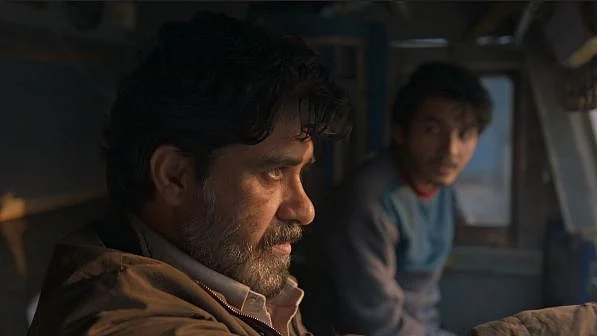Ivan Ayr’s sophomore film Meel Patthar (Milestone) premiered at the Venice film Festival ‘s Horizons (Orrizonti ) section just like his brilliant debut Soni that premiered in the same section two years ago.
Meel Patthar is a deeply profound and layered 98-min-long film about a man trying to grapple with his present in the face of an uncertain future and his own debilitating loneliness. The film opens with a dark screen as we hear sounds before we see visuals. Urgent footsteps, clanking of metal, rustling of plastic and just when we try and put together a mental picture of where we possibly could be, the vision greets us - a tired truck driver, a godown where trucks are being loaded. A misty foggy cold wintery morning envelops the screen and mysteriously us with it .
Much like his screen name, Ghalib, Suvinder Vicky brilliantly plays a truck driver with a poet’s soul. A Sufi sadness in his eyes, he nurses a back pain almost like a broken heart. The poetic lyricism is evident in the unhurried pace and Ghalib’s own way of dissecting life. In a particularly poignant scene when his young understudy Pash (Lakshvir Saran) tells him that people praise him for his selfless dedication to work, Ghalib retorts, “Kapde dekh kar banda padhne wali iss duniya ko kya pata kaun kiske liye jee raha hai” (Those who read a man by his clothes cannot be expected to know much ). And then the stark admission that he has been working double shifts to just cope with his wife’s death. There is a shroud of secrecy about Ghalib’s relationship with his wife . One wonders long after the film is over about what exactly happened. As someone asks him in the film, if he told his wife the truth, he replies with a sadness that’s distinctly his,
“Kya batata, sach toh use pata hi tha” (What would I tell her, she knew the truth).
Ghalib has indeed reached a milestone, he has driven 5 lakh kms on road. None of the other truck drivers with him have managed his feat, but where does his life’s journey take him? What is his destination? How many more milestones is he destined to cross?
In another moving scene when Pash comes to see death from close quarters, Ghalib wisened by his years on the road consoles him saying “Bhatere meel aane hain” (Many more milestones to come).
Ayr is austere in his filmmaking and the screenplay by him and Neel Manikent is devoid of excesses. A curious Pash asks “Aap Kuwait se wapis kyun aa gaye?” and“Tumne Saddam Hussain ka naam suna hai?” Ghalib enquires, in response. As Pash draws a blank, the silence hangs in the air.
What we glean about the characters, their hopes, crushed dreams come to us slowly, almost as if the film wants to ensure we are worthy to understand and empathise with their lot. Their impassive faces convey verisimilitude and a real sense of being uprooted and displaced. Be it the union leader (played by poet activist Aamir Aziz) who talks about floods in his native village and the fight for wages here, or how Ghalib’s own wife Etali missed her home back in Sikkim, or his sister-in-law and father who state they would never have come to him for compensation had their crops back home not been destroyed - everyone here is running from or towards something, most of the time being forced in situations they have little control over.
The passing of the baton to the young generation is inevitable, but how does one deal with the resultant oblivion that comes along with it asks Dilbag, Ghalib’s friend who has been unceremoniously forsaken by his employers. Ghalib has no ready answers and the film doesn’t provide us any either. The women here command our attention, be it the female sarpanch ( Mohinder Gujral), the tire repair lady (Shanti Devi) or Ghalib’s sister-in-law, Gaurika Bhatt, all displaying dignified courage.
As the young Pash slowly mirrors Ghalib’s own inner turmoil, Angello Faccini’s camera eloquently captures the sublime landscape with the immersive images that effectively convey desolation and loneliness. Suvinder Vicky mines the weariness on his face so beautifully, he breathes as thoughtfully as the film.
A cinematic milestone, Ivan Ayr’s Meel Patthar is a moving portrait of a man lacerated by the truth of life.
4.5 Quints out of 5.
(At The Quint, we question everything. Play an active role in shaping our journalism by becoming a member today.)
